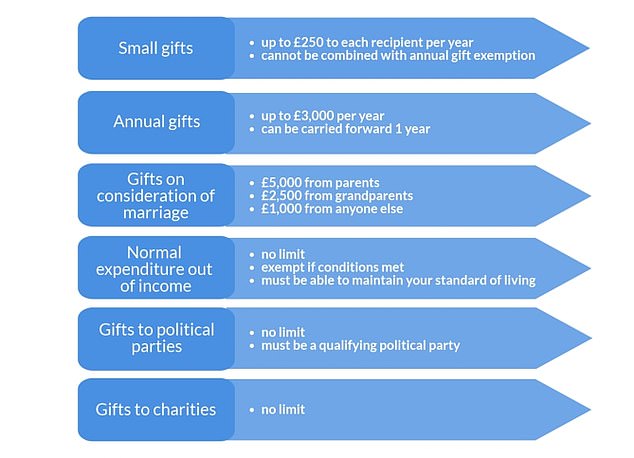If your late loved one was generous with gifts, then unless they kept good records you might have to turn detective when filling in inheritance tax forms.
Even when an estate is not large enough to pay death duties, a deceased person’s finances still need to be gone through – often information must be submitted just to prove they are exempt.
You have to get the figures right and hand over convincing evidence to His Majesty’s Revenue and Customs to back them up if necessary.
So, what happens if gifts were often made ad hoc, and memories among living relatives or friends about presents received years ago are hazy?
‘Often individuals don’t accurately track gifts made during their lifetime, leaving their executors with a paperwork headache on their death,’ says James Harrison, chartered financial planner at Path Financial.
‘Gifts do not count for inheritance tax purposes if they are made to a spouse, civil partner or charities. Gifts to anyone else are liable to count.’
We look at the gifting rules, the details HMRC requires on an inheritance tax form, and what to do if you are an executor trying to piece things together. We also explain how to keep a useful gift record for your relatives for when they need it.

What you need to know about inheritance tax and gifts
The number of families paying inheritance tax is bound to rise in coming years due to frozen thresholds, high property prices and pending pension changes.
It is levied at 40 per cent on estates above a certain size – you can find out the key inheritance tax thresholds here.
Gifts are one of the simplest ways to reduce an inheritance tax bill, because if you live for at least seven years they become exempt.
The seven year rule: You can gift £3,000 a year, plus make unlimited small gifts of up to £250, free from inheritance tax.
Wedding gifts are also exempt, although the amount depends on how close you are to the bride or groom.
If you die before the seven years are up, inheritance tax is levied on a sliding scale – starting at the full whack of 40 per cent if it’s within the first three years. See a full rundown of types of gifts and the sliding scale in the tables below.
James Harrison of Path Financial says: ‘In terms of limits, any amount can be directly gifted to start the “seven year clock” before the gift falls outside of the donor’s estate.
‘The £3,000 is not per recipient, but is the donor’s total allowance, so it could be split between multiple people, for example £1,500 to two people. Other gift allowances exist – you can give as many gifts as you like to different people of £250 per person each year.’
How much can you gift to avoid inheritance tax?

Long-standing: Inheritance tax gift limits haven’t changed since the 1980s
| Years between gift and death | Tax due |
|---|---|
| Less than 3 | 40% |
| 3 to 4 | 32% |
| 4 to 5 | 24% |
| 5 to 6 | 16% |
| 6 to 7 | 8% |
| 7 or more | 0% |
Gifts with reservation of benefit: Beware you don’t continue to benefit from a gift once it’s been handed over, or it can end up back in your estate and liable for inheritance tax.
Executors need to be mindful of gifts with reservation of benefit, says Diva Shah, a senior associate at law firm Kingsley Napley.
‘These are gifts which the donor has continued to benefit from after they were gifted and as such the seven year rule does not apply – such as a property which they gifted then continued to live in.’
Sean McCann, chartered financial planner at NFU Mutual, says the only way to make that work is to pay your children a market rent, check it at least every two years and keep records of consultations with the letting agents.
But there are income tax and capital gains tax implications for the recipients, and other complications.
‘HMRC has given examples that don’t fall foul of the rules because the person giving away property is “virtually excluded” from benefiting,’ says McCann.
‘These include a property you gift but stay in with the new owner for less than one month a year, or without them for less than two weeks a year.
‘Visits to the house for domestic reasons such as baby sitting or convalescence following medical treatment are also deemed to be within the rules.
‘There are other examples quoted including gifting a car, where the new owner gives you occasional lifts. HMRC goes as far as defining “occasional” as “being less than three times a month”.’
Gifts out of surplus income: You can make unlimited, regular gifts free of inheritance tax – to younger or older relatives, for example – but only if you can prove it’s coming out of spare income.
Such gifts must be made out of surplus funds, which means your beneficiaries may have to show HMRC your old bank statements to prove you did not need to spend that money on anything else.
More families are cottoning on to this method of cutting an inheritance tax bill. But Harrison says it is a very valuable but underused method for gifting, especially for family members such as children.
‘It is important to keep a clear record and consistent pattern of such giving, and the gifts must come from income and not from assets, and not reduce your standard of living.
‘However, gifts from surplus income fall immediately outside of your estate, unlike large one-off gifts.
‘In terms of the pattern, there is no set interval – monthly, quarterly, or annual all count – as long as there is a track record (or clear intention) of consistency.’
McCann says: ‘Many use the exemption to make outright gifts, put money into trust, or invest in pensions for younger members of the family. Many wealthy grandparents use it to help pay their grandchildren’s school fees, reducing their inheritance tax (IHT) liability in the process.
‘HMRC looks for a pattern of regular gifting from income and will review the frequency and amount of the gifts. Gifts made on a regular basis such as annually or more frequently are more likely to satisfy the test.
‘The first gift in a series can qualify even if you die shortly after making it, provided there is evidence that further regular gifts were planned.
‘For this reason, it’s a good idea to send your loved ones a note with the first gift confirming your intention to gift regularly and keep a copy with your will.’
What information will HMRC require?
The inheritance tax form IHT403 for gifts is here, and it can be used as a template for keeping a record for your family members.
Gifts made within the seven years before death are covered on page three. It requires executors to provide the following information for each gift.
– Date of gift
– Name and relationship of individual, charity or other organisation who received the gift (for example, son, daughter, business partner)
– Description of assets given away (for example, cash, the address of a house, the number of shares in a particular company, the premium paid on an insurance policy)
– Type of exemption or relief (for example, charity exemption, agricultural relief or business relief)
– A. Value at date of gift
– B. Exemptions or reliefs deducted (do not deduct taper relief here)
– C. Net value – A minus B
What counts as a gift?
When it comes to what you should and should not include, James Harrison of Path Financial says: ‘Gifts of money, shares, land or property all count.
‘So too do antiques, furniture or jewellery. Items like flowers or clothing don’t, though a particularly vintage or historic item of clothing would be worth closer inspection.’
Diva Shah of Kingsley Napley says: ‘HMRC defines a gift as anything that has a value including money, property or land, and items, such as jewellery or antiques and shares.
‘An individual can give as many gifts of up to £250 per person each tax year, as long as they have not used another allowance on the same person. Birthday or Christmas gifts from regular income are also exempt from inheritance tax.’
She says a gift like a box of chocolates should fall under one of the exemptions above, but any larger gifts of more than £250 would need to be reported to HMRC unless another exemption applied.
On the IHT403 form, gifts out of surplus income, or technically speaking ‘made as part of normal expenditure out of income’, are covered on page eight.
There are lists covering income and expenditure, and then the surplus. If you are the giver, you can fill them in over the years to provide a record and demonstrate the regular pattern for your executors to show the taxman.
Be aware that you get just six months, kicking off from the last day of the month after a loved one’s death, to add up their assets, calculate what is owed and hand over any inheritance tax due to the taxman.
If you miss the deadline then interest, currently 8.25 per cent, starts being charged. There are other penalties, including for errors, omitting assets and evasion.
If no money is due, you get 12 months leeway to simply fill in the forms to show nothing is owed, and you are also subject to penalties if you are late.
You can’t be granted probate, and get access to funds in an estate, until you have settled IHT matters with HMRC. After you get probate, HMRC can still come back and ask more questions.

If you give away art or other valuable items it’s important the recipient takes full ownership, including buying insurance – read more below on how HMRC can check insurance records
How do you track down info on gifts
If you have the task of putting a record together as executor or administrator of an estate, you can start with bank statements of the deceased and ask all potential gift recipients for information.
It might be that people who received gifts have bank records that can supply or corroborate vital information.
If they are beneficiaries, they should be willing to help to speed the process along so the estate can be distributed.
Jonathan Halberda, specialist financial adviser at Wesleyan Financial Services, says: ‘When someone dies without a clear record of the gifts they gave in life, it can cause serious complications for their family when completing HMRC’s IHT400 inheritance tax form.
‘Executors, usually family members or close friends named in a will, are responsible for declaring gifts made in the seven years before death.
‘Without a proper paper trail, they can be left trawling through old bank statements, chasing down beneficiaries, and making best guesses at an already emotional time, all while facing tight probate deadlines.’
Executors should keep a comprehensive record of all correspondence looking into gifting
Diva Shah, Kingsley Napley
Diva Shah says: ‘If no formal records exist, executors should be reviewing the deceased’s bank statements for the last seven years.
‘Beneficiaries should also be asked – it is not uncommon for gifts to have been made to family members who would have details of those gifts and the amounts.
‘Executors should keep a comprehensive record of all correspondence looking into gifting. If the gifted items are things such as jewellery or art, the executors might need to engage a professional valuer or at the worst use estimate value based on current market prices.
‘If there are no records, then estimates based on the best available evidence would allow reporting to HMRC.’
Shah warns: ‘Ultimately, executors and administrators of an estate are responsible for finding out whether any gifts were made by the deceased during their lifetime and reporting these to HMRC.
‘If the executor later discovered that a lifetime gift was made, they could be personally liable for the inheritance tax unless they can demonstrate that they did take all reasonable steps to obtain this information, but it was not available or they were misled by a beneficiary or the recipient of the gift.’

Our panel of inheritance experts: From left, Sean McCann of NFU Mutual, James Harrison of Path Financial, Diva Shah of Kingsley Napley and Jonathan Halberda of Wesleyan Financial Services
Tips on how to keep a good record of gifts
‘Good record keeping is about protecting your loved ones from future complications,’ says Halberda. ‘It doesn’t need to be burdensome, just consistent. A small admin task now could save your family considerable stress and cost later.
He always advises clients to keep a clear, simple record of their gifts.
‘A spreadsheet, notebook, or Word document are perfectly fine, as long as it records the date, amount, recipient and reason for the gift.
‘By updating it annually and storing it safely with your will, you can reduce the risk of delays, disputes, or unexpected tax bills later on.
‘Any gifts over £250 to a single person in a tax year, including birthday cheques, Christmas presents or help towards holidays, should be logged.
‘Even smaller gifts within HMRC allowances are worth recording for clarity. And it’s important to remember that it’s not just cash. Items like shares, jewellery or a car also count.’
James Harrison of Path Financial says: ‘A written physical or digital record, which is updated over time and stored somewhere secure and in a known location, is a sufficient record for executors to use when administering the estate.
‘This could be a “death box” which might also include will copies, or simply a file saved on a device. A digital backup is advisable in case of damage to physical paperwork.
‘The only real items required are: what was given (money, property), what the value of the gift was, when the gift was made, and to whom.’
Sean McCann of MFU Mutual says: ‘If you’re thinking about giving away jewellery, art works or other valuable items during your lifetime, it’s important that the new owner takes full ownership, including responsibility for insuring the item.
‘HMRC could ask to see your insurance records after your death to check whether valuable items you continued to insure also appear on your inheritance tax return.’
SIPPS: INVEST TO BUILD YOUR PENSION

AJ Bell

AJ Bell
0.25% account fee. Full range of investments

Hargreaves Lansdown

Hargreaves Lansdown
Free fund dealing, 40% off account fees

Interactive Investor

Interactive Investor
From £5.99 per month, £100 of free trades

InvestEngine

InvestEngine
Fee-free ETF investing, £100 welcome bonus
Prosper
Prosper
No account fee and 30 ETF fees refunded
Affiliate links: If you take out a product This is Money may earn a commission. These deals are chosen by our editorial team, as we think they are worth highlighting. This does not affect our editorial independence.












